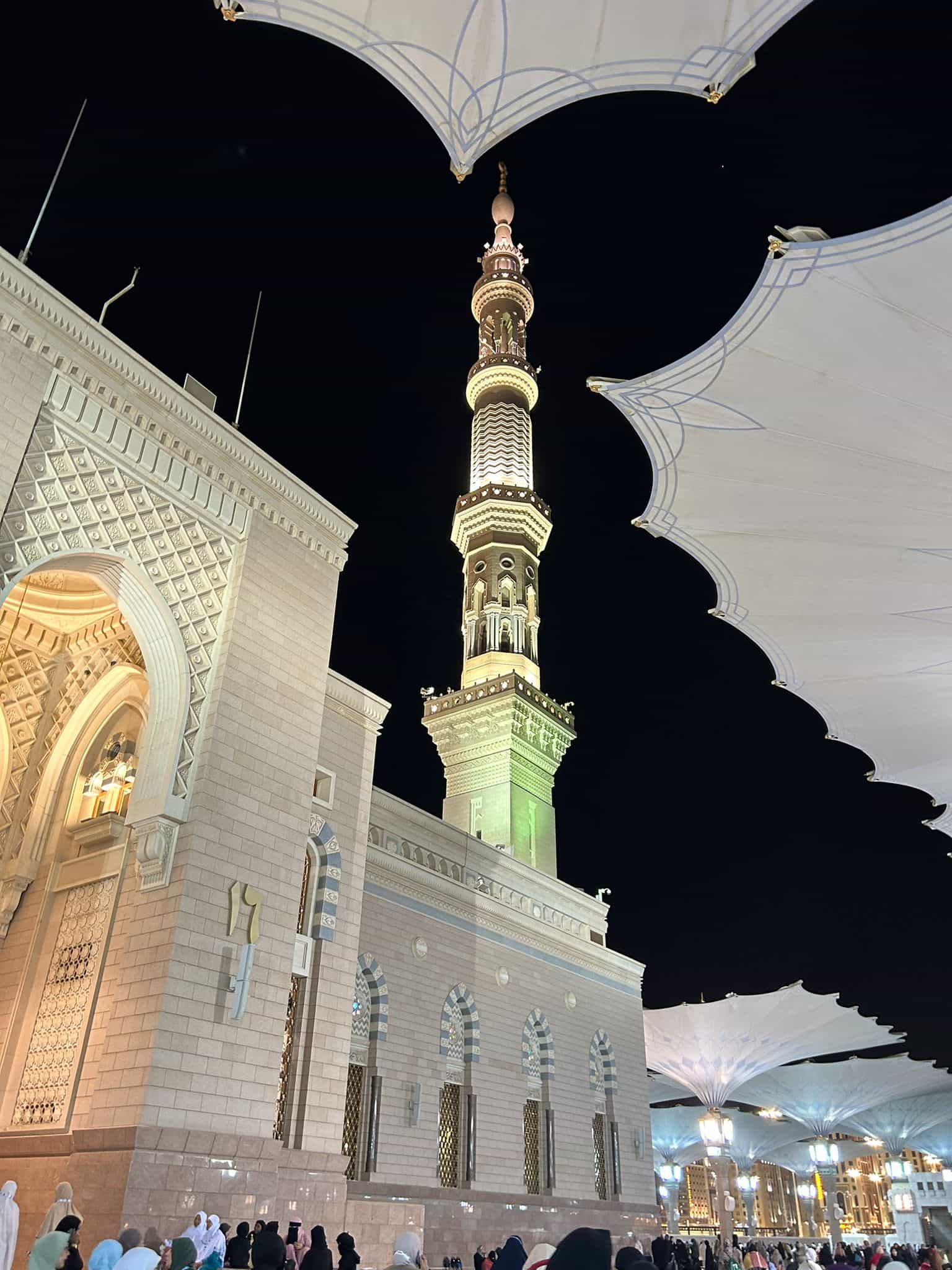Draw closer to Allah by loving Him – Tarawih reflections 23

Obeying the Prophet ﷺ = Obeying Allah
‘Whoever obeys the Messenger obeys Allah, and whoever turns away, then, We did not send you as a guardian over them.’ [4:80]
In this ayah Allah is talking about obedience to the Prophet Muhammad ﷺ. Scholars of tafseer have commented that this was revealed when some of the munafiqs (hypocrites) in Madinah were complaining about having to obey the Prophet ﷺ, saying it was equivalent to the Christians worshipping Jesus.
The Prophet’s ﷺ title was Messenger of Allah – i.e. he didn’t make things up from his own mind, but was delivering Allah’s own message. In the famous last ayahs of Surat al-Baqarah, Allah says,
ءَامَنَ ٱلرَّسُولُ بِمَآ أُنزِلَ إِلَيۡهِ مِن رَّبِّهِۦ وَٱلۡمُؤۡمِنُونَۚ
‘The Messenger believes in what has been revealed to him from his Lord, and so do the believers.’,
and teaches us to say,
سَمِعۡنَا وَأَطَعۡنَاۖ
‘We hear and we obey.’ [2:285]
This concept of obedience is one we see throughout the Quran – ‘Obey Allah and obey His Messenger.’
Obedience on autopilot
When we do our salah or dhikr etc., many of us find ourselves on autopilot. It is as if we are driving without paying attention, and discover in the middle of the route that we have arrived somewhere we were not intending.
What we really need is not this robotic obedience, but true submission that stems from love for Allah.
Loving Allah
Anas (may Allah be pleased with him) narrated that Prophet Muhammad ﷺ said,
عَنْ أَنَسٍ، قَالَ قَالَ النَّبِيُّ صلى الله عليه وسلم “ لاَ يُؤْمِنُ أَحَدُكُمْ حَتَّى أَكُونَ أَحَبَّ إِلَيْهِ مِنْ وَالِدِهِ وَوَلَدِهِ وَالنَّاسِ أَجْمَعِينَ ”.
‘None of you have faith until I am more beloved to him than his father, his children and all of the people.’ [Bukhari]
In some narrations, he said ‘until Allah and His Messenger are more beloved to him.’ You need to know Him to love Him.
‘None of you truly believes until Allah and His Messenger are dearer to him than anything else.’ [Musnad Ahmad]
If you don’t love Allah, your obedience is hollow. You will not enjoy praying, or avoiding haram, or doing any of the worship which Allah has commanded. The more we love Allah, the more we want to please him – this is the recipe for success.
Start by doing what’s obligatory
How do we love Allah? We need to know who He is. To know Him, we need to seek Him. In the famous Hadith Qudsi, Allah says,
وَمَا تَقَرَّبَ إِلَىَّ عَبْدِي بِشَىْءٍ أَحَبَّ إِلَىَّ مِمَّا افْتَرَضْتُ عَلَيْهِ، وَمَا يَزَالُ عَبْدِي يَتَقَرَّبُ إِلَىَّ بِالنَّوَافِلِ حَتَّى أُحِبَّهُ
‘My servant draws near to Me with nothing more beloved to Me than what I have made obligatory upon him, and My servant keeps drawing nearer to Me with voluntary works until I love him.’ [Bukhari]
The way to be close to Allah is to do what’s obligatory. Train yourself: even if you are on autopilot now, keep doing your fard while doing your best to become closer to Allah. Eventually, you will be able to pass this level and get to the next level of closeness.
This is why the Prophet ﷺ kept reminding us to love Allah and His Messenger. Look at our brothers and sisters in Gaza, who are like mountains able to tolerate what no one else could withstand. They don’t just have obedience to Allah – they have a deep love and connection with Him which gives them the strength to do this.
We ask Allah to help us strengthen our imaan by doing more acts of obedience based on our love of Him. Ameen.
Based on the reflections of Shaykh Haytham Tamim
Transcribed by Hana Khan
Related posts
Knowing Allah through His name Al Wadud
The duas Allah is quick to answer
- The truth is more powerful than lies
- Does a bride’s wali have to be Muslim?
- Is is permissible to lead a salah split over different rooms?
- Global IT outage. When systems go down…
- The concept of worship. What are ibadah and ihsan – and how do they lead to self development?
Recommended Posts

The truth is more powerful than lies
July 26, 2024

Global IT outage. When systems go down…
July 19, 2024

